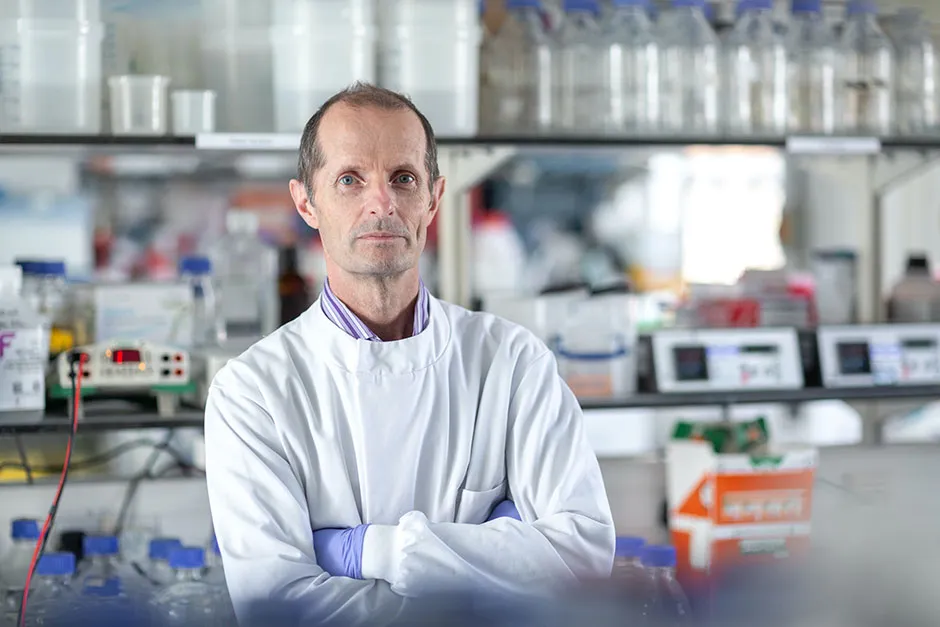More than 100 people will take part in the next phase of clinical trials to test a new coronavirus vaccine developed at Imperial College London.
Work began earlier this week to vaccinate a larger number of participants to assess the optimal dosage of Imperial’s COVID-19 vaccine candidate.
It follows a “successful” initial phase of the trial which involved 15 volunteers, Imperial said.
The next phase will see 105 people, aged 18 to 75, randomised to receive their first shot of one of three doses of the vaccine at a west London facility, followed by a booster shot four weeks later.
Neither the participants nor clinical staff will know which dose they have received, Imperial said.
Read the latest coronavirus vaccine news:
- Oxford vaccine: Early trials suggest 'double protection' from coronavirus
- COVID-19 vaccine ready in first half of 2021 if trials go 'really well'
- Coronavirus vaccines: Where are we now?
Professor Robin Shattock, who is leading the development of Imperial’s vaccine, said: “The progression to the next phase of the trial is an important step in assessing the safety of our vaccine.
“Analysing blood samples for antibodies and T-cell response will provide some indication of whether our vaccine can produce an immune response to fight the virus.”
Prof Shattock said larger clinical trials will still be required to determine whether the vaccine candidate is able to reduce the spread or severity of coronavirus.

The first 15 volunteers involved in the initial phase of the trials will return to receive a second booster dose in the coming days.
Imperial said all participants were being closely monitored by a clinical team, who will record any potential adverse reactions and analyse participants’ blood for the presence of neutralising antibodies against the virus.
The trials are the first test of a new self-amplifying RNA technology, which Imperial said had the potential to “revolutionise vaccine development” and enable scientists to respond more quickly to emerging diseases.
The vaccine was found to be safe in animal studies and produced “encouraging” signs of an effective immune response against the SARS-CoV-2 virus, Imperial said.
It has been developed following more than £40 million in funding from the government and further support from hundreds of donors.
Pre-clinical findings published in Nature Communications in July showed two doses of the vaccine produced “highly specific” neutralising antibodies against SARS-CoV-2 in mice, which were able to neutralise the virus, Imperial said.
Dr Katrina Pollock, clinical lead on the Imperial Covac1 study, said: “We have had a promising start but it remains too early to speculate whether our vaccine candidate will be effective in preventing infection.”
How do scientists develop vaccines for new viruses?
Vaccines work by fooling our bodies into thinking that we’ve been infected by a virus. Our body mounts an immune response, and builds a memory of that virus which will enable us to fight it in the future.
Viruses and the immune system interact in complex ways, so there are many different approaches to developing an effective vaccine. The two most common types are inactivated vaccines (which use harmless viruses that have been ‘killed’, but which still activate the immune system), and attenuated vaccines (which use live viruses that have been modified so that they trigger an immune response without causing us harm).
A more recent development is recombinant vaccines, which involve genetically engineering a less harmful virus so that it includes a small part of the target virus. Our body launches an immune response to the carrier virus, but also to the target virus.
Over the past few years, this approach has been used to develop a vaccine (called rVSV-ZEBOV) against the Ebola virus. It consists of a vesicular stomatitis animal virus (which causes flu-like symptoms in humans), engineered to have an outer protein of the Zaire strain of Ebola.
Vaccines go through a huge amount of testing to check that they are safe and effective, whether there are any side effects, and what dosage levels are suitable. It usually takes years before a vaccine is commercially available.
Sometimes this is too long, and the new Ebola vaccine is being administered under ‘compassionate use’ terms: it has yet to complete all its formal testing and paperwork, but has been shown to be safe and effective. Something similar may be possible if one of the many groups around the world working on a vaccine for the new strain of coronavirus (SARS-CoV-2) is successful.
Read more:
